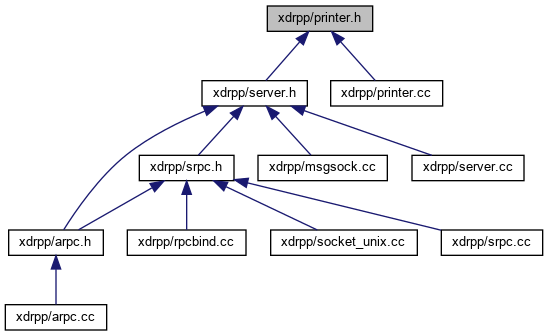Support for pretty-printing XDR data types. More...
Include dependency graph for printer.h:

This graph shows which files directly or indirectly include this file:

Go to the source code of this file.
Namespaces | |
| xdr | |
| Most of the xdrpp library is encapsulated in the xdr namespace. | |
Macros | |
| #define | ENABLE_IF(expr) typename std::enable_if<expr>::type |
| Poor man's version of C++14 enable_if_t. | |
Functions | |
| std::string | xdr::escape_string (const std::string &s) |
| Use hex escapes for non-printable characters, and prefix backslashes and quotes with backslash. More... | |
| std::string | xdr::hexdump (const void *data, size_t len) |
| Turn a string into a double-length sequence of hex nibbles. | |
| template<typename T > | |
| std::string | xdr::xdr_to_string (const T &t, const char *name=nullptr, int indent=0) |
| Return a std::string containing a pretty-printed version an XDR data type. More... | |
| template<typename T > | |
| std::enable_if< xdr_traits< T >::valid, std::ostream & >::type | xdr::operator<< (std::ostream &os, const T &t) |
Print an arbitrary XDR structure to a std::ostream. More... | |
Detailed Description
Support for pretty-printing XDR data types.
Function xdr::xdr_to_string converts an arbitrary XDR data type to a string. In addition, if you say using xdr::operator<<;, you can use the standard operator<< to print XDR types.
You can customize how a particular user-defined type T gets printed by defining a function std::string xdr_printer(const T&) in the same namespace as T.
Definition in file printer.h.
 1.8.13
1.8.13